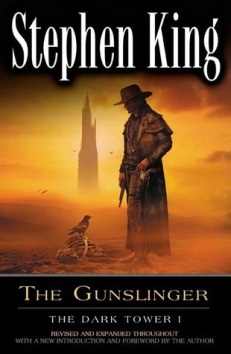When writing characters, where do you start? Maybe a name, or a physical description, or some basic personality traits. Before long you’ll probably wonder how your character got the way he or she is now. Which is why it’s important for the story to start before it actually starts, if you get my meaning. That means character backstory.
Take, for example, Roland Deschain from Stephen King’s The Gunslinger. He’s a sombre, soft-spoken, mysterious type, and you probably would be too if you had a childhood like his—Roland’s mom was sleeping with his dad’s top advisor, for god’s sake. In fact, Roland’s past is so important to his present that we need to see it up close and personal. That means backstory.
But offering details on a character’s background is tricky. Constant flashbacks interrupt the flow of a progressing story, and dropping little details into the narrative can sometimes come across as expository. For example, Character A says, “Remember when you had more fingers?” Character B frowns and says, “Sure. I’ll never look at blenders the same way again.”
Of course these characters remember that moment. In fact, the only thing a writer does by including this exchange is tell reader exactly what’s going on. Which is about as subtle as a slap to the face.
King, however, handles the backstory of The Gunslinger perfectly. It’s a novel that’s very much about the past, a novel where each character is shaped and motivated by events which happened long before. These events are so important, in fact, that it won’t suffice to reference them through dialogue or brief description. So here’s what King does, and does very well: He references characters we’ve never met before, then explains who those characters are in subsequent flashbacks.
For example, a boy from New York City named Jake Chambers suddenly appears in the Roland’s world without explanation. Jake tells Roland that he can’t remember anything about how he got there, so we’re left to wonder. That, however, would be quite the fraying loose end. So King gives us a brief flashback.
Fortunately, it’s not just a flashback for the sake of a flashback. We learn two very important details from it: One, that Jake died before coming to the gunslinger’s world, and that is perhaps why he’s there. And two, that Jake was somehow sent there by the man in black, who is the gunslinger’s arch nemesis (excuse the lack of actual names—it’s all about the mystery, baby).
I’m drawn to this aspect of King’s novel because I struggle a lot with character backstory in my writing. It’s hard to know what to give and when to give it, but it’s a skill that can be developed through practice and careful study of the pros.
Kyle A. Massa is a speculative fiction author living somewhere in upstate New York with his fiancee and their two cats. His stories have appeared in numerous online magazines, including Allegory, Chantwood, and Dark Fire Fiction. To stay current with Kyle’s work, subscribe to his email newsletter. He promises not to spam you.



The passing of time can be such a tricky thing when writing; your analysis of King’s novel is very helpful! On a side note, I dig the tagline of your blog–oxford comma love. For more fun with literature, check out aliteralinterpretation.wordpress.com. I think you’ll like it!
The Oxford comma will never die! I’ll be sure to check it out. Thanks for the comment!
I keep meaning to read that series… I listened to a Stephen King audiobook with a short story set in the same universe, The Little Sisters of Eluria, and I really like it — though it read a tad more like a Wild West story than fantasy. But in the same sort of genre-blurring. way the show Firefly was a Wild West story set in space.
I love coming up with character backstory, but then my problem is how exactly to drop that information in there.
Yes, I think Firefly is a great comparison. The second and third books feel more strongly fantasy, while the first is more strongly a western. Each one has elements of both genres, though. And I struggle with where to put backstory, too. I definitely recommend reading The Gunslinger for a great example of how to do it. Thanks for commenting!